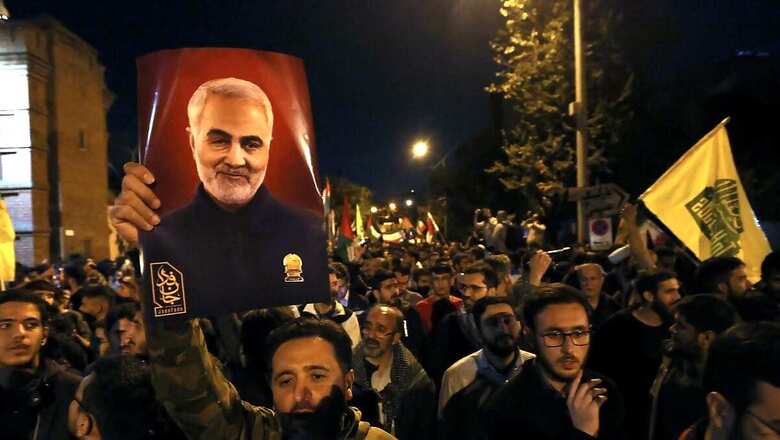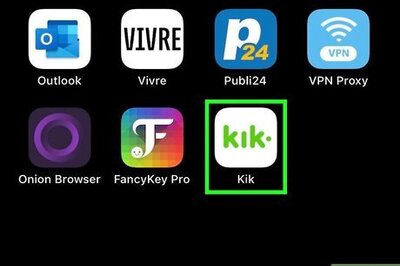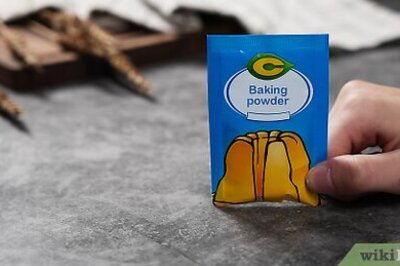
views
Declared a “living martyr” by Iran’s supreme leader Ayatollah Khamenei while still alive, Qasem Soleimani headed the Quds Force – the foreign operations arm of the Islamic Revolutionary Guards Corps that oversees military operations across the Middle East.
Killed by the US in a drone strike on January 3, 2020, the slain general’s name is in the news once again after a blast at his burial site killed at least 103 on his fourth death anniversary on Wednesday. He was widely regarded as a hero for his role in defeating the Islamic State in both Iraq and Syria.
Soleimani was long seen as a deadly adversary by the US and its allies. In fact, Iran’s Revolutionary Guards recently claimed that a key motivation for the October 7 attacks on Israel by Tehran-backed Hamas was to avenge his death. The Palestinian militant group has, however, denied this.
One of the most important power brokers
Many Iranians saw Soleimani as the man whose military and strategic prowess were instrumental in warding off the multi-ethnic disintegration of neighbouring countries such as Afghanistan as well as Syria and Iraq. He was one of the most important power brokers across the region, setting Iran’s political and military agenda in Syria, Iraq and Yemen.
In 2020, on the days after the general’s death and leading up to his funeral in his hometown of Kerman, millions turned out to mourn him in a show of national unity. A survey published in 2018 by IranPoll and the University of Maryland found Soleimani had a popularity rating in Iran of 83 percent, ahead of then-president Hassan Rouhani and then-foreign minister Mohammad Javad Zarif.
Even on the day, supporters had rallied around his grave in Kerman when the blasts struck near the Saheb al-Zaman Mosque. He was one of the most popular figures in Iran and wielded his regional clout publicly since 2018 when it was revealed that he had direct involvement in top-level talks over the formation of Iraq’s government. In the years leading to his death, Soleimani became an unlikely celebrity in his country, replete with a huge following on Instagram.
He was pushed forward as the public face of Iran’s intervention in the Syrian conflict from 2013, appearing in battlefield photos, documentaries – and even being featured in a music video and animated film. In a rare interview aired on Iranian state television in October, he said he was in Lebanon during the 2006 Israel-Hezbollah war to oversee the conflict.
“To Middle Eastern Shiites, he is James Bond, Erwin Rommel and Lady Gaga rolled into one,” wrote former CIA analyst Kenneth Pollack in a profile for Time’s 100 most influential people in 2017.
“To the West, he is… responsible for exporting Iran’s Islamic revolution, supporting terrorists, subverting pro-Western governments and waging Iran’s foreign wars,” Pollack added.
Spoke on important social issues
While western leaders saw him as central to Iran’s ties with militia groups, including Lebanon’s Hezbollah and Palestinian Hamas, part of his appeal was the suggestion that he might bridge Iran’s bitter social divides on issues such as its strict “hijab” clothing rules.
“If we constantly use terms such as ‘bad hijab’ and ‘good hijab’, reformist or conservative… then who is left?” Soleimani said in a speech to mark World Mosque Day in 2017.
“They are all people. Are all your children religious? Is everybody the same? No, but the father attracts all of them,” he had said.
Born on March 11, 1957, the shadowy Soleimani, who later turned into a national icon, was only 62 when he was killed in Baghdad. He started working at a young age and joined the Iranian Revolutionary Guards after the 1979 Islamic Revolution in Iran and fought in the Iran-Iraq war of 1980-88. He was named the head of the Quds force in 1998 for his strategic thinking and leadership abilities.
“The warfront is mankind’s lost paradise,” Soleimani recounted in a 2009 interview. “One type of paradise that is portrayed for mankind is streams, beautiful nymphs and greeneries. But there is another kind of paradise… The warfront was the lost paradise of human beings, indeed.”
Little is known about his childhood, though accounts suggest the general’s father was a peasant who received a piece of land under the Shah Mohammad Reza Pahlavi but later became encumbered by debts. By the time he was 13, Soleimani began working in construction, later as an employee of the Kerman Water Organization.
On the battlefield, however, Soleimani was known to voice his opposition to “meaningless deaths”, weeping at times with fervour when exhorting his men into combat, embracing each individually.
Hamas attack to avenge Soleimani’s death?
The Revolutionary Guards recently claimed that the October 7 attacks by Hamas militants were in part a retaliation of the US killing in 2020 of Soleimani. The remarks were made by a Guards spokesman appearing to suggest that a key motivation for the attacks was to avenge the top Iranian commander’s death on the country’s behalf.
Iran, which supports Hamas financially and militarily, has hailed the deadly attacks as a “success” but denied any direct involvement. “Undoubtedly, part of the great historic victory… is due to the efforts of General Qasem Soleimani,” Ramezan Sharif, spokesman for Iran’s Islamic Revolutionary Guard Corps (IRGC), had said about the Hamas attacks.
“One can consider the (Hamas) operation’s success as part of the resistance’s revenge against his cowardly assassination,” Sharif was quoted by as saying Fars news agency.
He said “the 70-year oppression, the occupation, insults to the Al-Aqsa mosque, and the siege and massacre of the defenceless Palestinians” were also among the motives for the Hamas attack. Sharif earlier told a news conference in Tehran that the Hamas attacks on October 7 were among “acts of revenge” for Soleimani’s killing carried out “by the Americans and with the support of the Zionists (Israel)”.
Those remarks, which Sharif later said were “misunderstood”, drew a rare rebuke from Hamas that said “there is no truth” in them. “We have announced on several occasions the motivations and reasons behind Operation Al-Aqsa Flood, namely the dangers facing Al-Aqsa mosque,” said Hamas in a statement.
(With agency inputs)


















Comments
0 comment